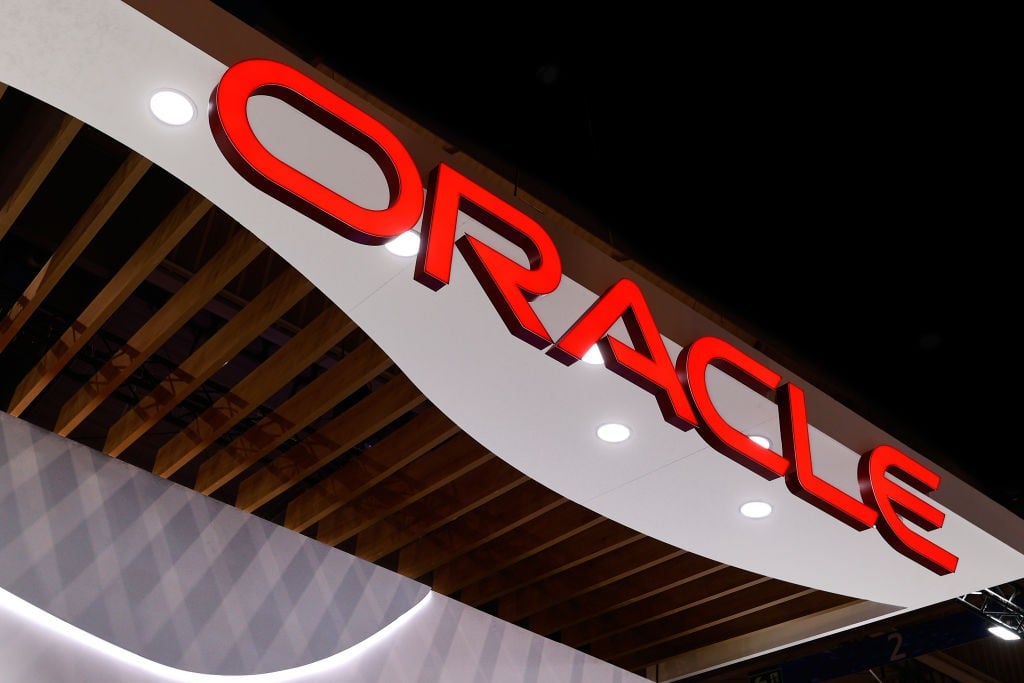Shares of Oracle (ORCL +0.60%) have beaten the market in the long run. Whether your chart covers the last 10 or 15 years, the database giant's stock comes in way ahead of the S&P 500 benchmark every time.
On the other hand, Oracle investors have sees a 15% fall over the last 52 weeks, and the once-unstoppable earnings machine has been running on empty lately. The stock now trades at a lofty 17.5 times trailing earnings, which is among the highest P/E ratios Oracle has seen in recent years.
Does that combination of high valuation and sinking earnings make Oracle a risky stock to own today? Let's take a deeper look.
First, Oracle's issues are not skin deep. Over the last four quarters, the company has taken a 3.5% revenue haircut. That's not a disaster, but the damage gets worse the further down you go on Oracle's income and cash flow statements.
Earnings per share are down by 11% over the same period. That includes the shareholder-friendly effect of generous buybacks, which have reduced Oracle's share count by 3.9%. Without that touch of financial engineering -- which added up to $8.7 billion in net buyback expenses -- adjusted net income fell 13%. GAAP earnings are down 15%, and free cash flows have decreased by 17%.
In short, this is not how things should work. Step by step, moving closer and closer to unadjusted cash earnings, Oracle's results only look worse.
This is not a new phenomenon, either. Stretch that time frame out to five years, and you get the same stratification. Easily manipulated EPS figures always smell like roses, even when the cash flows stink.
That's enough to drive a nervous man distracted. But wait -- there's more.

Safra Catz and Mark Hurd, co-CEOs of Oracle. Source: Oracle.
Who is running the show?
Oracle is fortunate to have two very capable chief executive officers on board:
- Mark Hurd proved his cost-cutting and operational discipline chops as CEO of Hewlett-Packard. He walked away from HP under a cloud of scandal, but that takes nothing away from his razor-sharp knack for profitability.
- Safra Catz has a deep understanding of how Oracle works, having held executive titles there since 1999 and a boardroom seat since 2001. Catz has an eye for game-changing deals. She also previously held the title of CFO, underscoring both a profound familiarity with Oracle's finances and an additional wallop of operating power.
Unfortunately, Oracle runs under two CEOs. Yes, one of the company's greatest potential strengths also serves as a major weakness.
If Hurd held the CEO post alone, he would undoubtedly bring in the same cost controls that worked his magic at HP. Shareholders would applaud the rising profits and wider margins, even if the same moves undermined Oracle's long-term prospects due to a budget-starved R&D department.
Pushing Hurd aside and giving Catz the reins would probably lead to more of the audacious buyouts and mergers that we have come to expect from Oracle. Peoplesoft, Sun Microsystems, Siebel, BEA Systems -- all were megadeals with price tags north of $5 billion, and often brought Oracle into brand-new markets overnight. But since Catz got half a CEO seat next to Mark Hurd, the largest buyout was the piddling $500 million plug-in addition of virtual computing manager Ravello Systems.
If you couldn't tell, I think Catz would be the far superior choice for a solo CEO. Hurd's tactics work great in the short run, but are actually long-term poison.
Beyond all this drama, it's a safe bet that Oracle founder Larry Ellison pulls a lot of the operational strings. As chairman of the board, he still wields a heavy stick. Is that good or bad? I don't know -- and that in itself only makes me more nervous.
Final verdict: Oracle is a risky stock
Oracle is facing a plethora of new market challenges. In the database world, NoSQL solutions like Couchbase, Cassandra, and MongoDB are stealing the thunder of Oracle's old-school relational database system. Elsewhere, it's all cloud computing all the time, and Oracle is not really a player in that sector.
On top of these organic market pressures, Oracle is operating under a poor management structure where nobody really calls the shots anymore. The results of that double whammy show up in the falling share prices and shrinking profits of every type.
I have never owned Oracle shares, nor is the current setup tempting me to take a position right now. The stock looks expensive, cash profits are plunging, market forces are actively working against Oracle -- and again, the corner office is too crowded. None of these problems are going away overnight, and I would actually like to lose at least a couple of them before clicking that "buy" button for Oracle shares.







